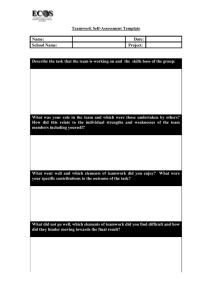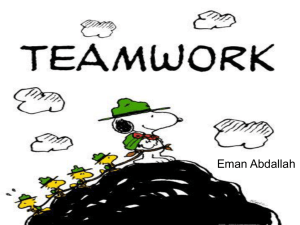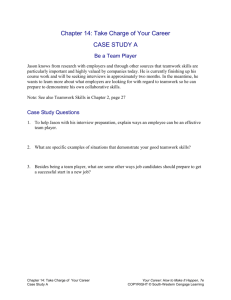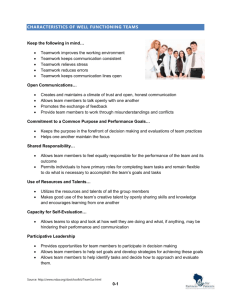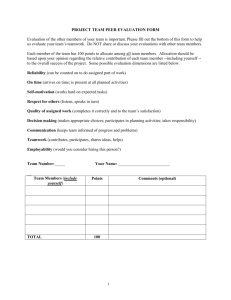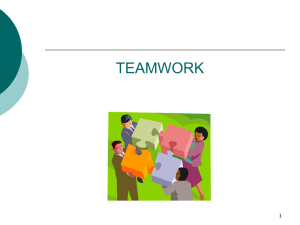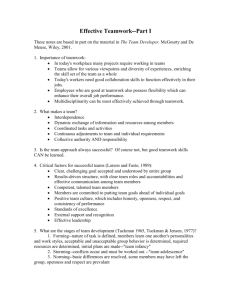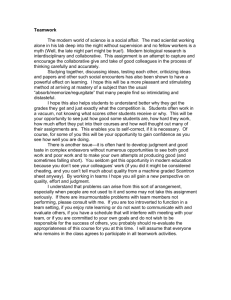Teamwork - cmoseby3
advertisement
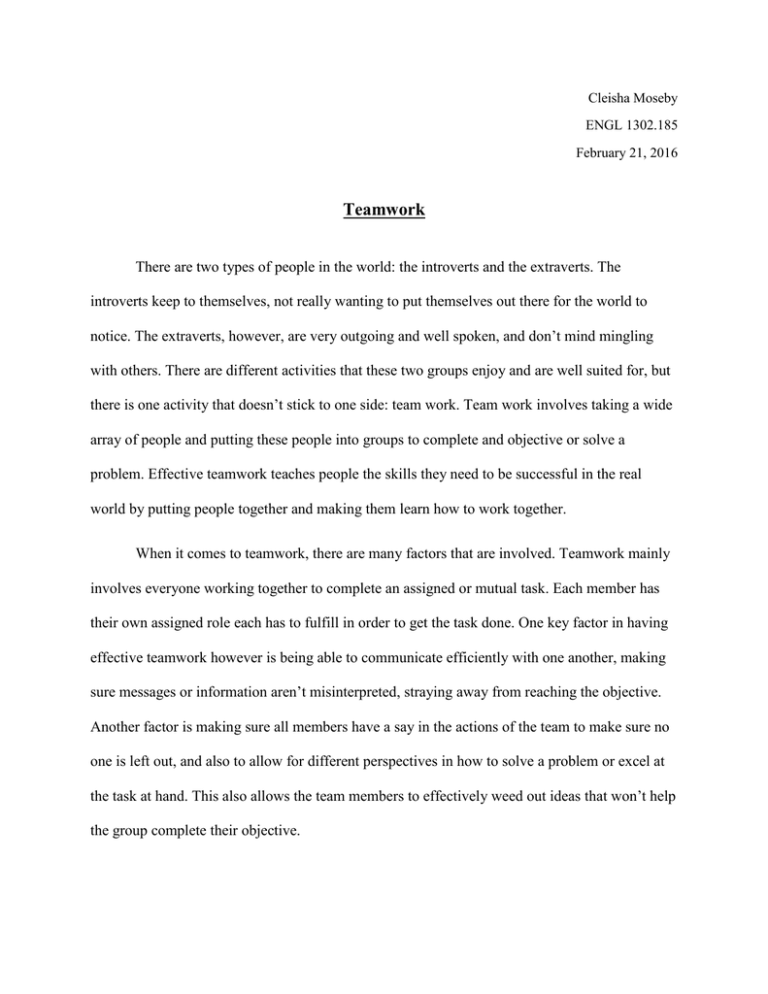
Cleisha Moseby ENGL 1302.185 February 21, 2016 Teamwork There are two types of people in the world: the introverts and the extraverts. The introverts keep to themselves, not really wanting to put themselves out there for the world to notice. The extraverts, however, are very outgoing and well spoken, and don’t mind mingling with others. There are different activities that these two groups enjoy and are well suited for, but there is one activity that doesn’t stick to one side: team work. Team work involves taking a wide array of people and putting these people into groups to complete and objective or solve a problem. Effective teamwork teaches people the skills they need to be successful in the real world by putting people together and making them learn how to work together. When it comes to teamwork, there are many factors that are involved. Teamwork mainly involves everyone working together to complete an assigned or mutual task. Each member has their own assigned role each has to fulfill in order to get the task done. One key factor in having effective teamwork however is being able to communicate efficiently with one another, making sure messages or information aren’t misinterpreted, straying away from reaching the objective. Another factor is making sure all members have a say in the actions of the team to make sure no one is left out, and also to allow for different perspectives in how to solve a problem or excel at the task at hand. This also allows the team members to effectively weed out ideas that won’t help the group complete their objective. From what I learned working in a team, it is least likely that you will work with people who are like minded, or are for the most part in agreement with how you do things or think the same way as yourself. You often have to deal with an array of personalities, and sometimes egos, that you have to figure out a way to make those come together in order to get your work done. Being in a team kind of throws you into a setting with obstacles that you don’t run into when you’re working on your own. That being said, you sort of have to learn to compromise with others and hold your tongue to things you may not agree with. Overall, in a team, I’ve learned you have to put your pride and some of your wants aside for the greater benefit of the group. For example, last semester I was in a science triad and there were two girls that I had to work with on every single group assignment in all of our triad classes. Ashley had a work ethic completely opposite to my own, and an attitude that I was to say the least not okay with. Sally, on the other hand was like minded to me and we got along well (names were changed for discretion). Even though I had problems with how Ashley did things, for example here using second grade grammar in some of our presentations, Sally and I would purposefully give her the less important sections to cover in the presentation instead of being rude about it, so the grammar would not affect the grade greatly. She also didn’t take criticism well, so instead of giving her an attitude back, I’d just calmly remind her to think of how our professor would grade our work and what he’d think of some of the information she’d try to add. Working in teams may be difficult at times, but it taught me communication skills as well as other techniques to help diffuse problems that would arise in the group. In my experience in working in a team, I learned that I can be a bit controlling in how things are done, especially when it came to major assignments. I also learned that I pay too much attention to tiny details that don’t necessarily matter too much in certain assignments, including the template used for a PowerPoint. But on the positive side, I learned that I am able to push aside certain things I may not agree with or like in order to get an assignment done right, and to make other group members satisfied. I ultimately learned how to be the bigger person in a situation from my time spent in working in groups. In groups, I observed that group members can be a bit stubborn and not as open to the ideas of others, even when those ideas trumped theirs. Pride and ego tends to play a huge role in group work, and sometimes reflects the overall quality of the group assignment. I learned this the hard way on my First Year Symposium assignment last semester when Ashley, despite my constant nudging to add actual results charts to the Results section she was assigned in our project, thought she knew what was best to be added to her section of the group’s project. When it came time to present, the group was embarrassed by the graders when one of them pointed out that our Results section was half done. For the Argument of Evaluation and Presentation, I can apply some of my skills and experiences to the project. Whether or not one may believe it, team work allows certain skills to develop and flourish. Through effective teamwork, I have been able to better effectively communicate with others. I feel more confident giving presentations, and I know how to more effectively communicate my ideas and opinions to others, as well as prove my ideas/opinions. I also learned how to take responsibility for my work. I am able to put more effort into the work I do, and fulfill my responsibilities to others since I have a better understanding that what I put my name on and claim is a reflection of me and who I am as a person. I also get things done in a faster past, while still maintaining a satisfactory quality in work. Team work has taught me these skills that I can apply to my college education, as well as the real world. In many ways effective team work can benefit an individual. You learn how to work with others, as well as have the opportunity to be able to see how others think and do things. Whether if you’re in a team of people you know, or in a team of complete strangers, effective team work gives you some of the skills needed in the real world.
